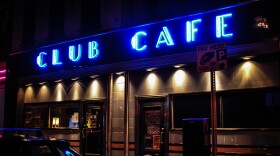Henry Reese, a co-founder of Pittsburgh’s City of Asylum, was onstage with Salman Rushdie last week when the famed author was attacked and seriously injured in an event in Chautauqua, N.Y.
Reese also suffered minor injuries in the attack by a knife-wielding assailant. But he said the incident only deepens his group’s commitment to shelter persecuted writers — a mission a talk by Rushdie himself inspired some 25 years ago in Pittsburgh.

In a phone interview conducted after he returned from Chautauqua, Reese declined to discuss the attack on Friday or the details of his injuries. Reese and Rushdie were preparing to do an on-stage interview about the role of the U.S. in helping persecuted writers when the attack took place.
In the context of Rushdie’s own decades of living under a death threat for his writings from the government of Iran, Reese called the incident a “metaphor made material.”
“It’s a reminder just how much in danger there is for writers,” he said. “The attack there at Chautauqua was not only an attack there on him, his ideas and organizations like City of Asylum, but it’s an attack on the very idea of free expression that he works so hard to advance.”
Reese was a businessman when, in 1997, he heard Rushdie speak here at the old Syria Mosque in Oakland. It was one of Rushdie’s first public appearances in the U.S. after years in hiding: In 1989, an Iranian leader had issued a fatwa deeming Rushdie’s novel “The Satanic Verses” blasphemous and calling for the acclaimed writer’s death.
At that talk, Rushdie spoke briefly of his efforts to create a network for threatened writers, later known as the City of Asylum network. Seven years later, Reese and colleagues — including his wife, artist Diane Samuels — opened their first house of refuge in the Central North Side.
City of Asylum now owns multiple residences and has hosted more than a dozen writers from China, Algeria, the Sudan, Vietnam and elsewhere. It also runs a year-round slate of free public readings and other performances.
Reese said Rushdie helped the group get on its feet and stayed in touch through the years. In 2005, for instance, he spoke at a fundraiser here for the group, and during that same visit, he turned his author talk at the Byham Theater into another fundraiser, Reese said.
Reese recently announced he was stepping down as City of Asylum’s board chair but remains on its board. As Rushdie recovers from his injuries, Reese said he had been heartened by the messages he had received.
“There’s been an outpouring of communication to us about me personally, about Cty of Asylum and its meaning to people in the community, that this attack reminded people of truly what the values are we have to defend," he said. "And I would say almost a re-up in commitment from people,” he said.
He said the need for shelter for persecuted writers is growing. The International Cities of Refuge Network, or ICORN, to which City of Asylum belongs, last year received some 400 applications in the 70 or so cities where it operates. Because most cities take one writer at a time for a two-year residency, the demand for such help far outstrips the supply. He said the Taliban takeover of Afghanistan following the U.S. withdrawal ballooned the requests for help by “thousands.”
Besides Pittsburgh, the U.S. has refuge programs in Detroit and Ithaca, N.Y. Reese said the attack won’t derail City of Asylum’s efforts to grow that number.
“If anything, it strengthens our commitment,” he said.













